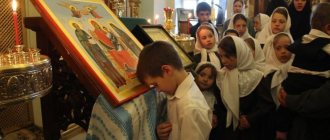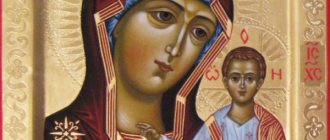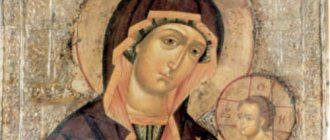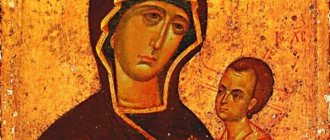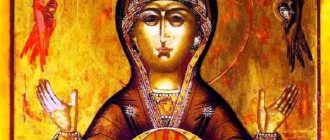History of appearance
The text of the akathist “Redeemer from the Sorrow of Suffering” is intended for prayerful appeal to the icon of the Most Holy Theotokos “Redeemer”. The history of this icon goes back several centuries.
The first appearance of the sacred image has been known since 1841. The owner of the icon was one of the monks of the Athos monastery, Martinian. The icon became famous after the saint’s prayers before the face for the deliverance of the harvest from an invasion of locusts.
The story of saving people from hunger spread throughout the Greek province, and people began to go to the elder to pray before the miraculous image. After the death of Martinian, by the will of the elder, the icon was transported to the Russian monastery on New Athos.
The face of the Virgin Mary saved the life of Alexander III and his family during a train disaster in which they were returning from vacation. In honor of the extraordinary salvation of the royal family, a celebration of the holy image was established, which fell on October 30 according to the new style.
The second appearance of the Liberator occurred in October 1917. This time, the Mother of God appeared in a dream to a resident of the village of Tashla, Samara region, Ekaterina. The girl was told the burial place of the icon.
Catherine, together with her friends, actually managed to find the icon in the indicated place, where the spring later flowed out. Another of the lists of the Redeemer is in the monastery of St. Nicholas, where it was brought in 1997 by two residents of Arzamas.
Initially, the image on it was unclear, covered with black soot. But gradually the blackened table miraculously began to glow, and the faces of the Virgin Mary and Jesus appeared on it. From the inscription, which was soon removed, it became clear that this was an image of the “Deliverer from Trouble.”
Since then, the priests of the monastery have read Akatist to the Redeemer weekly. And miracles that occur through the prayers of those suffering are recorded in a special church book.
Deliverance from the troubles of the suffering - Icon of the Mother of God
- Icon of the Mother of God
- Deliverance from the troubles of those suffering
- Celebration of All Saints' Week
More than two centuries ago, a peasant Fedot Alekseevich Obukhov lived in the village of Bor. He was a pious man who loved to donate money to decorate his native church. One day, on the day of the Epiphany, on the way from the city of Bolkhov, he was overtaken by a terrible blizzard with severe frost. Soon the road was completely covered with snow. The horse was exhausted and stopped at an impassable ravine. In the cold, Obukhov was completely chilled. Seeing no means of salvation, he unharnessed his horse, wrapped himself up, lay down in the sleigh and began to fall asleep, not realizing that he was freezing. But even in these terrible moments, he managed to pray to the Mother of God, mentally vowing to paint Her icon “Seeking the Lost.” In a neighboring village there lived a peasant, a friend of Obukhov. And then, in the howling of the blizzard, he suddenly heard someone’s voice under the window: “Take it.” Leaving the house, he saw his old friend Fedot Obukhov in the sleigh. Upon recovery, Obukhov immediately began to fulfill his vow, ordering the painter the icon of the Mother of God “Seeking the Lost.” When the icon was ready, he first brought it to his parental home, and from there “carried it on his head to his native church. The Bor icon became famous for its grace-filled signs and wonders. After some time, other images of “Recovery of the Dead” became known in Russia.
This icon of the Most Holy Theotokos is located in the St. Nicholas Arzamas Convent. The icon updates itself. According to the sisters of the monastery where she is located: “This miracle “began to happen” already in 1997. The sisters remember that it was then that a light spot appeared on the completely blackened icon, like a ray of sunlight highlighting a small oval part of the icon measuring 10-15 cm. It was imprinted on the neck of the Mother of God and the hand of the Infant Savior touching it. The sisters remembered that it was in the middle of the summer of 2000 that this “solar luminosity” began to increase rapidly. And - lo and behold! It was as if someone, invisible to us, was removing all this blackness in thin layers, like scales. The face of the Savior and the face of the Mother of God gradually became clear. The royal crown on the head of the Queen of Heaven is already visible, the blessing hand of the Savior, His legs resting on the right hand of His Mother, the colors of the clothes are determined. Moreover, everything did not appear evenly and smoothly, as a human hand would do, but precisely in such a way that it was obvious, joyful, and comforting.
The name of the icon was illegible. One autumn, a Riga nun came and, looking at the icon, said with joy and trepidation that Angels were cleaning it. She was the first to presumably determine the name of the icon - “Deliverance from the troubles of the suffering.” But only in the summer of 2001 were we able to reliably determine the name of the image based on its already significantly cleared details.”
Meaning in Orthodoxy
The icon “Deliverer from Troubles,” to which the akathist is dedicated, is one of the most significant for Orthodox Christians.
Each detail of the image of the Mother of God depicted on the icon has a specific meaning:
- The red veil (maforium) and blue tunic speak of the royal grandeur and virgin purity of the Mother of God.
- The gilding on Christ's robe indicates God's grace and holiness.
- The scroll that the Baby holds in his hands symbolizes the Old Testament.
- The golden frame of the miraculous icon is a symbol of Divine light.
The Akathist text describes the miracles that occurred after prayers near the sacred image.
Many believers, praying to the Intercessor, received healing from physical and mental illnesses. Holy Mother of God:
- help people keep faith in their hearts,
- instructs sinners who cannot walk the right path on their own,
- relieves alcohol intoxication, fever, eye diseases;
- helps preserve marriage;
- treats children;
- protects those who need it.
The enormous power of the prayer hymn dedicated to the Blessed Virgin Mary is based on people’s faith in God. The intercessor is ready to provide his heavenly attention and protection to any Orthodox Christian who believes in omnipotence and love. To the one who forgives everything about the Lord.
How does the icon help?
The prayer “Deliverance from the troubles of the afflicted” is of great importance for every person who carefully preserves in his heart the love of the Lord and the Mother of God. Any people who pray to this face can be saved from misfortunes and begin to enjoy life again.
Our Lady can help:
- it can help preserve the marriage and prolong it. If you ask the Mother of God for help with family troubles, she will definitely bring peace and tranquility to the relationship;
- it is known that the holy face can help get rid of alcohol, tobacco and drug addictions;
- who has diseases of the organs of vision and hearing, she grants healing;
- you can ask for help when visiting bad thoughts - it is not difficult for the Most Holy Theotokos to protect a believer even from himself;
- The holy icon is often placed in the room of a terminally ill person. If you pray to her every day and wash the patient’s face with holy water, then his condition may improve;
- for young parents whose children are often sick, it will help in recovery.
This icon is like a conductor between the Mother of God and people. If the prayer is sincere, then you can count on help in the near future.
How to read correctly
They usually resort to reading Akatista if they need help with something very important. The prayer hymn can be read once or read over several days. When reading extensively, it is advisable to turn to the priest for a blessing.
The priest will tell you how many days you need to read the text of the eulogy. Usually it takes 40 days. But when making such a decision, you need to take into account that reading should take place daily, without interruption.
The Akathist can be read in church or at home on your own. Like all prayer hymns, the recitation of Akatista the Liberator is preceded by some prayers:
- preliminary;
- "Trizon";
- "Our Father";
- "Glory even now."
It is best to read the prayer hymn in the morning, while your thoughts are not occupied with everyday worries. If a person does not have health problems, a prayer service is read while standing.
It is better if the image of the Mother of God is before your eyes. But this does not mean that help comes from the image of the Mother of God; one must turn not to the icon, but to the Most Holy Intercessor.
Prayer does not have to be formal. An akathist is not a magical ritual that satisfies any request.
To receive the help of the Mother of God, you need not only to pray in front of the holy image, but also to participate in the life of the church, attend services and lead a righteous lifestyle.
Don’t forget that the akatist is not only a prayer, but also a song of praise. Therefore, it can be performed as a sign of gratitude to the Redeemer.
An akathist is an Orthodox hymn, and an icon is a means of communication with higher powers
Initially, an akathist is a hymn addressed to a saint or God. He glorifies his addressee, talks about his exploits and merits, and humbly asks for something.
This is a fairly ancient form of poetry, which originated in ancient times. If desired, its traces can be traced in Ancient Egypt, and other peoples have similar ritual practices.
The Church adopted many good things from Ancient Greece. Sports, philosophy, art. And poetry is not in last place here. The first akathist, by the way, is also addressed to the Most Holy Theotokos.
Among the saints, she is especially loved in Orthodoxy, and in terms of the number of akathists, only Jesus Christ can compare with her.
The Akathist to the Mother of God “Deliverer” was not written for this particular icon.
But it is recommended to read it precisely before the images with the title “Deliverer”. It's more efficient that way. Like any Orthodox hymn, it addresses higher powers.
In our case - to the Most Holy Theotokos. It is wrong to read the akathist to the icon. She is only a conductor, a telephone receiver for communication with the Mother of God.
Continuing the technical metaphor, we can say that through the ancient icon “Deliverer of Troubles” the connection is for some spiritual reason better.
Full text in Russian
Kontakion 1
You will accept us as enemies in order to embitter us, and as our Lord, in order to separate us from our Lord and teach us to sing to You, Mother of God, this was great:
Rejoice, Redeemer, from pain, misfortune and death, saving us who mourn.
Ikos 1
There are a lot of angels, according to you, Our Mother, by order they take up arms for liberation, this is menacing, but you accepted this prayer:
Rejoice, you who send us angels of salvation; Rejoice, queen of the armies of the mountains, granting us heavenly help.
Rejoice, protecting us as an angel; Rejoice, crushing our enemies with the army of angels.
Rejoice, Redeemer, from pain, misfortune and death, saving us who mourn.
Kontakion 2
They see how the audience interprets and in their hearts much of your help to those who call upon them, and they are commanded to constantly repeat Your Son: Alleluia.
Ikos 2
Many understand, since your son, your Redeemer, gives peace to the world of strife, we also sing to Ty:
Rejoice, scoundrels; Rejoice, you who mourn with consolation.
Rejoice, healing the sick; Rejoice, desperately.
Rejoice, Redeemer, from pain, misfortune and death, saving us who mourn.
Kontakion 3
The power of the Almighty was given to Tai to help and save the world and us who are perishing in trouble. And who among you has not been saved, and who does not sing to your Son: Alleluia.
Ikos 3
You have an incomprehensible love for humanity, which you did not accept with a sigh, you did not dry your tears and which you did not make appeal to yourself, exclaiming:
Rejoice, hearing the ambulances running; Rejoice, sad and painful consolation.
Rejoice, quick salvation for those who are perishing; Rejoice, freedom captured.
Rejoice, Redeemer, from pain, misfortune and death, saving us who mourn.
Kontakion 4
The storm of misfortune falls upon us, saves us who are perishing, our Redeemer, a storm that will perish on earth, taming and welcoming our song: Alleluia.
Ikos 4
Listening to humanity, it gives birth to all your love for Christians and your mighty deliverance from all who are fierce towards them, learning to sing to you:
Rejoice, deliverance from human troubles; Rejoice, storm of the end of life.
Rejoice, lowly exorcist; Rejoice, joy to our grieving donor.
Rejoice, Redeemer, from pain, misfortune and death, saving us who mourn.
Kontakion 5
A fitting divine star, driving out darkness and gloom in the hearts of sinners, so that in the light of your love they can see the Lord and sing to Him: Alleluia.
Ikos 5
Russian people see your deliverance from many different troubles and joyfully sing to you:
Rejoice, our help in trouble; Rejoice, pain is our withdrawal.
Rejoice, banish our pains; Rejoice, consolation to our pain.
Rejoice, Redeemer, from pain, misfortune and death, saving us who mourn.
Kontakion 6
They preach your help and love, Mother, healing, comfort, joy and salvation from your troubles, and sing to your highest son: Alleluia.
Ikos 6
Raise to us the Light of salvation in the darkness of destruction that surrounds us, and insist on singing to You:
Rejoice, you who drive out the darkness of sins; Rejoice, darkness of sin.
Rejoice, the darkness of my soul shines; Rejoice, rejoice with the joy of your soul with the light.
Rejoice, Redeemer, from pain, misfortune and death, saving us who mourn.
Kontakion 7
Although we must give ourselves up to the utmost despair, wherever trouble arises, the thought of You, the Redeemer, encourages and comforts us, singing to Your Son: Alleluia.
Ikos 7
He showed us His mercy, new and unexpected, taking us under His hand and everywhere at the cry of Ty, the Mother of God:
Rejoice, Queen Empress; Rejoice, you who have taken us under your dominion.
Rejoice, for I protect us; Rejoice, you have defeated our enemies.
Rejoice, Redeemer, from pain, misfortune and death, saving us who mourn.
Kontakion 8
A strange miracle: at the death of those condemned and in need of countless torments, they unexpectedly receive salvation and liberation from You, O Lover, singing to God: Alleluia.
Ikos 8
Everything that exists in the darkness of sorrows, everything that is overcome by misfortune with the storm, comes to a good refuge and our help, the protection of the Virgin Redeemer, calling on Her:
Rejoice, source of joys; Rejoice, drive away the pain.
Rejoice, sufferings of liberation; Rejoice, giver of peace.
Rejoice, Redeemer, from pain, misfortune and death, saving us who mourn.
Kontakion 9
The whole person praises Ty, everyone sings the praise of Ty, the manifold liberation that brings joy along with pain, which your Son and God sing: Alleluia.
Ikos 9
Vetii of manifold madness, I see your quick and wonderful deliverance from the miseries of those who suffer liberation, and he fell silent, chanting Ty:
Rejoice, the wonderful world has surprised you; Rejoice, for you who miraculously strengthened us.
Rejoice, you who have destroyed evil through miracles; Rejoice, for you have confounded your enemies by the power of God.
Rejoice, Redeemer, from pain, misfortune and death, saving us who mourn.
Kontakion 10
Save, even if every human soul, with all its love for it, teaches you to sing to its Son: Alleluia.
Ikos 10
At the wall of the Christian world, guarding and protecting every soul from enemies, your icon, the Redeemer, will appear in the world of Orthodoxy and miracles, may you be glorified as a worshiper of God:
Rejoice, our lady, who has chosen Mount Athos for herself; Rejoice, our Redeemer, that you blessed New Athos with your blessing.
Rejoice, our joy, the sign of the unification of your parts of your inseparable land, your icon, revealed to you; Rejoice, our eternal joy, who enjoyed the wonderful care of the young monastery of New Athos.
Rejoice, Redeemer, from pain, misfortune and death, saving us who mourn.
Kontakion 11
Continuous song will bring You, Master, You joy and You, the flocks joy to be found, and to Your Divine Son they will sing with joy: Alleluia.
Ikos 11
Like a radiant light shining in the darkness of sin, Your icon, the Redeemer, appeared to us, instructing us to sing to You:
Rejoice, freeing us from joy; Have fun removing harmful nature from your plants.
Rejoice, crops and forests, and everything that grows from destruction, saves; Rejoice, suffering collective farmers, comfort and fatigue are their blessing.
Rejoice, Redeemer, from pain, misfortune and death, saving us who mourn.
Kontakion 12
The grace of your icon, the Redeemer, flowing, abundantly giving healing streams and enlivening the heart with joy, overcomes all the desires of your song, Mother, and your son and Boy.: Halleluh.
Ikos 12
We sing healing, from the holy icon of Your being, we sing above all else the resurrection of Anastasius Otrak and sing praise:
Rejoice, you who raise the dead; Rejoice, you who revive the dying with all your heart.
Rejoice, take away from death and eternal fire; Rejoice, our mortal hope and protection.
Rejoice, Redeemer, from pain, misfortune and death, saving us who mourn.
Kontakion 13
O our sweetest and most loving Mother! Have mercy now and have mercy, in the fierce and desperate despair, run to save us, teach us to sing with all our hearts to God who forgives us: Alleluia.
This kontakion is read three times, then the 1st ikos and the 1st kontakion.
Akathist to the Mother of God: deliverer from troubles
Kontakion 1
Forbid our enemy to embitter us and separate us from our Lord, of course, and teach us to sing to You, Mother of God, cheerfully:
Rejoice, Deliverer, saving us, the needy, from grief, misfortune and death.
Ikos 1
Many angels, according to Your command, our Mother, are taking up arms for our threatening deliverance, but You accept this prayer:
Rejoice, you who send angels to our salvation; Rejoice, Queen of the ranks of the mountains, who bestows their heavenly help upon us.
Rejoice, thou who commandest us as an angel to protect us; Rejoice, thou who destroyest our enemies with the host of angels.
Rejoice, Deliverer, saving us, the needy, from grief, misfortune and death.
Kontakion 2
Those in need see the great and plentiful help of Your heartfelt calling upon You, and are thus instructed to sing to Your Son unceasingly: Alleluia.
Ikos 2
Many people understand that the world has given You, Your Son, Deliverer to the needy, and we also sing to You:
Rejoice, Mother of the needy; Rejoice, consolation to those who suffer.
Rejoice, healing of the sick; Rejoice, unreliable hope.
Rejoice, Deliverer, saving us, the needy, from grief, misfortune and death.
Kontakion 3
The power of the Most High was given to You for the help and salvation of the world and us, who are perishing in troubles. And who is not delivered by You, and who does not sing to Your Son: Alleluia.
Ikos 3
Having an incomprehensible love for the human race, no sighs did you accept, no tears did you wipe away, and no one you forced to call upon Thee, crying out:
Rejoice, quick hearing for those in need; Rejoice, consolation for the sad and sorrowful.
Rejoice, quick salvation for those who are perishing: Rejoice, freedom for those who were captive.
Rejoice, Deliverer, saving us, the needy, from grief, misfortune and death.
Kontakion 4
A storm of misfortunes will come upon us, save us who are perishing, O our Deliverer, who has tamed the destructive storm on earth and accepted our song: Alleluia.
Ikos 4
Hearing humanity give birth to all Your wondrous love for Christians and Your powerful deliverance from all the evil ones that come upon them, learning to sing to You:
Rejoice, deliverance of the human race from troubles; Rejoice, the storms of life have ceased.
Rejoice, persecutor of despondency; Rejoice, giver of joy through sorrow.
Rejoice, Deliverer, saving us, the needy, from grief, misfortune and death.
Kontakion 5
Being more like a god than a star, you disperse darkness and darkness in sinful hearts, so that in the light of Your love they will see the Lord and sing to Him: Alleluia.
Ikos 5
Seeing the people of Russia Your unexpected deliverance from various troubles, they joyfully sing to You:
Rejoice, our helper in troubles; Rejoice, our sorrow is greater than the taking away.
Rejoice, our sorrows have been driven away; Rejoice, there is consolation in our sorrows.
Rejoice, Deliverer, saving us, the needy, from grief, misfortune and death.
Kontakion 6
They preach Your help and love, Mother, healing, consolation, joy and salvation from troubles by You and sing to Your high-powerful Son: Alleluia.
Ikos 6
Shine upon us the Light of salvation in the darkness of destruction that surrounds us, and instruct You to sing:
Rejoice, dispelling the darkness of sins; Rejoice, you who consume the darkness of sin.
Rejoice, enlightening the darkness of my soul; Rejoice, encouraging the soul with the light of joy.
Rejoice, Deliverer, saving us, the needy, from grief, misfortune and death.
Kontakion 7
Even if we want to give ourselves over to ultimate despair, to the troubles that lie everywhere, let us think about You, the Deliverer, and be encouraged and comforted, singing to Your Son: Alleluia.
Ikos 7
Showing us Your mercy in a new and unexpected way, accepting us under Your sovereign hand, and from everywhere we cry out to You, Mother of God:
Rejoice, O mighty Queen: Rejoice, thou who hast taken us under Thy dominion.
Rejoice, Thou who hast given us Thy protection; Rejoice, thou who has defeated our enemies.
Rejoice, Deliverer, saving us, the needy, from grief, misfortune and death.
Kontakion 8
A strange miracle: upon the death of the doomed and innumerable people languishing in need, they suddenly receive salvation and deliverance from You, the All-Loving One, singing to God: Alleluia.
Ikos 8
All who are in the darkness of sorrows, all who are overwhelmed by misfortunes and storms, come to the good refuge and our help, the protection of the Virgin Deliverer, crying to Her:
Rejoice, source of joys; Rejoice, drive away sorrows.
Rejoice, deliverance from troubles; Rejoice, giver of all peace.
Rejoice, Deliverer, saving us, the needy, from grief, misfortune and death.
Kontakion 9
All human beings praise Thee, everyone sings to Thee, who brings manifold deliverance, instead of sorrows, giving joy to those who sing to Your Son and God: Alleluia.
Ikos 9
The branches of great wisdom are distraught, seeing Your speedy and miraculous deliverance from the troubles of the afflicted, and they fall silent to us who sing to You:
Rejoice, you who surprised the world with miracles; Rejoice, you who strengthened us through miracles.
Rejoice, you who destroyed godlessness with miracles; Rejoice, you who have put to shame your enemies by the power of God.
Rejoice, Deliverer, saving us, the needy, from grief, misfortune and death.
Kontakion 10
Though you may save every soul of man, caring for it with all your love, until you teach it to sing to Your Son: Alleluia.
Ikos 10
With a wall that protects the Christian world and protects every soul from enemies, Your icon, the Deliverer, appears in the Orthodox world and glorifies miracles, The people of God sing to You:
Rejoice, our mentor, who chose the holy Mount Athos as her lot; Rejoice, our Redeemer, who blessed New Athos with Your blessing.
Rejoice, our joy, the sign of the unbreakable union of Your earthly inheritances revealed by Your icon; Rejoice, our eternal joy, who favored the young New Athos monastery with your miraculous care.
Rejoice, Deliverer, saving us, the needy, from grief, misfortune and death.
Kontakion 11
They bring unceasing singing to Ty, the Lady, through Your deliverance and through You they again have found joy and sing joyfully to Your Divine Son: Alleluia.
Ikos 11
Your icon, O Redeemer, appears to us as a luminous and radiant luminary in the darkness of sin, instructing us to sing to You:
Rejoice, thou who deliverest us from famine; Rejoice, you who drive away harmful nature from plants.
Rejoice, saving crops and forests and everything growing from destruction; Rejoice, consolation for mourning farmers and blessing for their labor.
Rejoice, Deliverer, saving us, the needy, from grief, misfortune and death.
Kontakion 12
Grace from Your icon, Redeemer, flowing, abundantly giving streams of healing and enlivening hearts with joy, conquers everyone by the will of singing to You, Mother, and to Your Son and God: Alleluia.
Ikos 12
We sing of the healings that come from Thy holy icon, we sing especially of the resurrection of the youth Anastasius and sing in praise:
Rejoice, you who raise the dead; Rejoice, you who revive dead hearts.
Rejoice, you who take away from death and eternal fire; Rejoice, our posthumous hope is protected.
Rejoice, Deliverer, saving us, the needy, from grief, misfortune and death.
Kontakion 13
O our all-singing and all-loving Mother! Have mercy now and have mercy, delivering us from the cruel and hopeless sorrows of today, teach us to heartily sing to God, who forgives us: Alleluia.
This kontakion is read three times, then the 1st ikos and the 1st kontakion.
Ikos 1
Many angels, according to Your command, our Mother, are taking up arms for our threatening deliverance, but You accept this prayer:
Rejoice, you who send angels to our salvation; Rejoice, Queen of the ranks of the mountains, who bestows their heavenly help upon us.
Rejoice, thou who commandest us as an angel to protect us; Rejoice, thou who destroyest our enemies with the host of angels.
Rejoice, Deliverer, saving us, the needy, from grief, misfortune and death.
Kontakion 1
Forbid our enemy to embitter us and separate us from our Lord, of course, and teach us to sing to You, Mother of God, cheerfully:
Rejoice, Deliverer, saving us, the needy, from grief, misfortune and death.
By leaving a comment, you accept the user agreement
